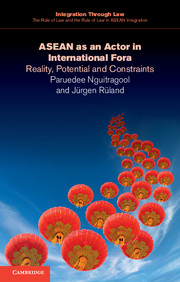
ASEAN as an Actor in International Fora: Reality, Potential and Constraints
ASEAN as an actor in International Fora addresses a blind spot in ASEAN research and in comparative regionalism studies by assessing why, how, when and to what extent ASEAN member governments achieve a collective presence in global fora. Written for academic researchers and practitioners working in areas such as international relations, political science and international law, this book examines ASEAN’s negotiating behaviour with a novel four-point cohesion typology. The authors argue that ASEAN’s ‘cognitive prior’ and its repository of cooperation norms have affected ASEAN’s negotiation capacities, formats, strategies and cohesion in international fora. Using two case studies—one on ASEAN’s cohesion in the WTO agricultural negotiations and one on UN negotiations on forced labour in Myanmar—they examine ASEAN’s collective actions at different stages of negotiation, in different issue areas and in different negotiating fora. The book concludes by providing recommendations for strengthening ASEAN’s international negotiation capacities.
– Explores an entirely new and so far overlooked theme on Southeast Asian regionalism: readers will better understand how the ASEAN behaves as an actor and negotiator in global forums, how it represents its interests and how cohesively it acts
– Develops a novel typology of cohesion for regional organisations in international negotiations: readers will better understand how and why regional organisations act more or less cohesively at different stages of international negotiations
– Explores how historical experiences and intra-regional cooperation norms can influence the behaviour of a regional organisation towards external actors: readers will understand that regional collective action and interests towards third parties are not only informed by cost-benefit calculations and material factors, but are strongly guided by cognitive factors
About the ASEAN Integration Through Law book series
Published by Cambridge University Press, this book series evaluates ASEAN’s community-building process and issues at the forefront of ASEAN law and policy. The series covers six themes: the general architecture and aspirations of ASEAN, the governance and management of ASEAN, the legal regimes in ASEAN, the ASEAN Economic Community, ASEAN and the world, and the substantive laws of ASEAN. Click here for the executive summaries of the books in this series.

